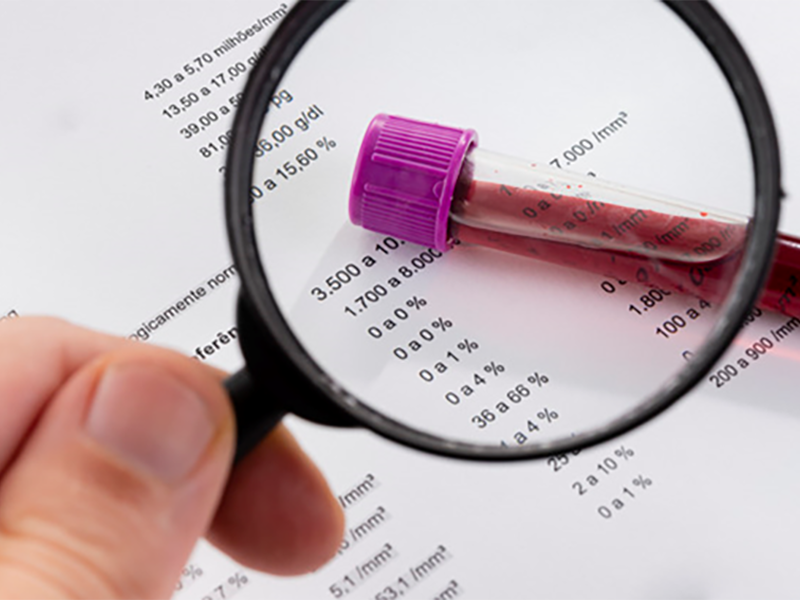
Complete Blood Count (CBC)
Watch our video about Complete Blood Count (CBC)
A Complete Blood Count (CBC) is a laboratory test that evaluates the composition and health of blood cells. This exam measures different components of the blood, including red blood cells (RBCs), white blood cells (WBCs), hemoglobin, hematocrit, and platelets.
The CBC is a routine and essential test used for screening, diagnosing, and monitoring various health conditions. It provides a comprehensive overview of a patient’s immune response, oxygen transport efficiency, and clotting function, making it a fundamental tool in preventive medicine.
What is a CBC Used For?
A CBC test serves multiple diagnostic and monitoring purposes, including:
- Assessing general health and detecting infections.
- Identifying anemia and blood disorders.
- Monitoring immune system function and inflammatory conditions.
- Detecting blood clotting abnormalities.
- Evaluating chronic diseases, such as leukemia or autoimmune disorders.
- Monitoring the effects of medications that impact blood cell production.
- Guiding further diagnostic tests and medical treatments.
Due to its wide-ranging applications, a CBC is often included in routine health check-ups and diagnostic evaluations.
How Does a CBC Work?
The CBC procedure follows these steps:
- Blood Sample Collection: A healthcare provider draws a small blood sample from a vein, usually in the arm.
- Laboratory Analysis: The blood is processed using automated analyzers to measure cell counts, hemoglobin levels, and other key indicators.
- Result Interpretation: A physician or Hematologist reviews the results, identifying any abnormalities that may indicate health conditions requiring further evaluation.
The procedure is quick and minimally invasive, with results typically available within a few hours to a day.
Types of CBC Tests
There are different types of CBC tests, each analyzing specific aspects of blood health.
1. Standard CBC (Complete Blood Count without Differential)
A standard CBC provides an overall assessment of red blood cells, white blood cells, hemoglobin, hematocrit, and platelets.
This test is useful for detecting anemia, infections, and general health conditions. It is often included in annual check-ups and preoperative assessments.
2. CBC with Differential
A CBC with Differential measures different types of white blood cells (WBCs), including neutrophils, lymphocytes, monocytes, eosinophils, and basophils.
This detailed analysis helps doctors differentiate between bacterial and viral infections, detect immune system disorders, and evaluate allergic reactions or chronic inflammatory conditions.
3. Reticulocyte Count (Immature Red Blood Cells)
A reticulocyte count measures the number of young red blood cells (reticulocytes) in circulation.
This test is useful for evaluating bone marrow function, anemia recovery, and the body’s response to blood loss or treatment. It is often recommended for patients undergoing chemotherapy or bone marrow transplants.
What Conditions Can a CBC Detect?
A CBC test helps diagnose a variety of health conditions, including:
- Anemia – Low red blood cell count or hemoglobin levels, causing fatigue and weakness.
- Leukemia and Other Blood Cancers – Abnormal white blood cell counts indicating malignancies.
- Infections (Bacterial, Viral, or Fungal) – Elevated WBC count suggesting an immune response.
- Inflammatory and Autoimmune Disorders – Conditions like lupus, rheumatoid arthritis, or chronic inflammation.
- Blood Clotting Disorders – Low platelet counts leading to excessive bleeding or clotting issues.
- Dehydration and Nutritional Deficiencies – Hematocrit and hemoglobin changes due to iron, B12, or folate deficiencies.
- Chronic Diseases (Kidney or Liver Conditions) – Abnormal blood cell counts reflecting systemic illnesses.
When is a CBC Recommended?
A CBC is indicated in various medical situations, including:
- Routine Health Screenings – As part of an annual check-up or pre-surgical evaluation.
- Unexplained Fatigue or Weakness – To check for anemia or vitamin deficiencies.
- Fever and Signs of Infection – To determine if bacteria, viruses, or inflammation are present.
- Unexplained Bruising or Bleeding – To evaluate platelet function and clotting disorders.
- Suspected Blood Disorders or Cancer – To assess abnormal white or red blood cell counts.
- Autoimmune Disease Monitoring – To track immune response changes over time.
- Medication Side Effects – To monitor blood cell production in patients undergoing chemotherapy or immunosuppressive therapy.
Pre and Post-CBC Care
Before the CBC Test:
- No fasting is usually required, unless combined with other blood tests.
- Drink plenty of water before the test to facilitate blood collection.
- Avoid strenuous exercise or alcohol consumption the day before, as they may temporarily alter blood counts.
After the CBC Test:
- Resume normal activities immediately, as the procedure is minimally invasive.
- If bruising occurs at the puncture site, applying a cold compress can reduce discomfort.
- Discuss abnormal results with your doctor, who may recommend further testing if necessary.
Contraindications for CBC
A CBC is a safe test, but there are a few situations where caution is needed:
- Patients with a fear of needles or blood draw-related anxiety may experience discomfort.
- Individuals with bleeding disorders may need special care to prevent excessive bruising.
- Recent blood transfusions or medications can affect CBC results, requiring adjustments in interpretation.
For these cases, alternative diagnostic methods may be considered.
Alternatives for Patients Who Cannot Undergo a CBC
For individuals unable to take a CBC, alternative blood tests include:
- Serum Iron and Ferritin Tests – To assess anemia and iron deficiency.
- Bone Marrow Biopsy – For in-depth evaluation of blood cell production.
- Liver and Kidney Function Tests – To identify systemic diseases affecting blood composition.
Schedule Your CBC Test at Clinic Consultation
Complete Blood Count (CBC) testing is available at Clinic Consultation, performed in a safe and professional environment. Whether you need a routine Blood Test or an in-depth health evaluation, our specialists ensure accurate results and expert analysis.
📅 Book your CBC test appointment today and take a proactive step toward monitoring your health!
Click here to schedule an appointment online